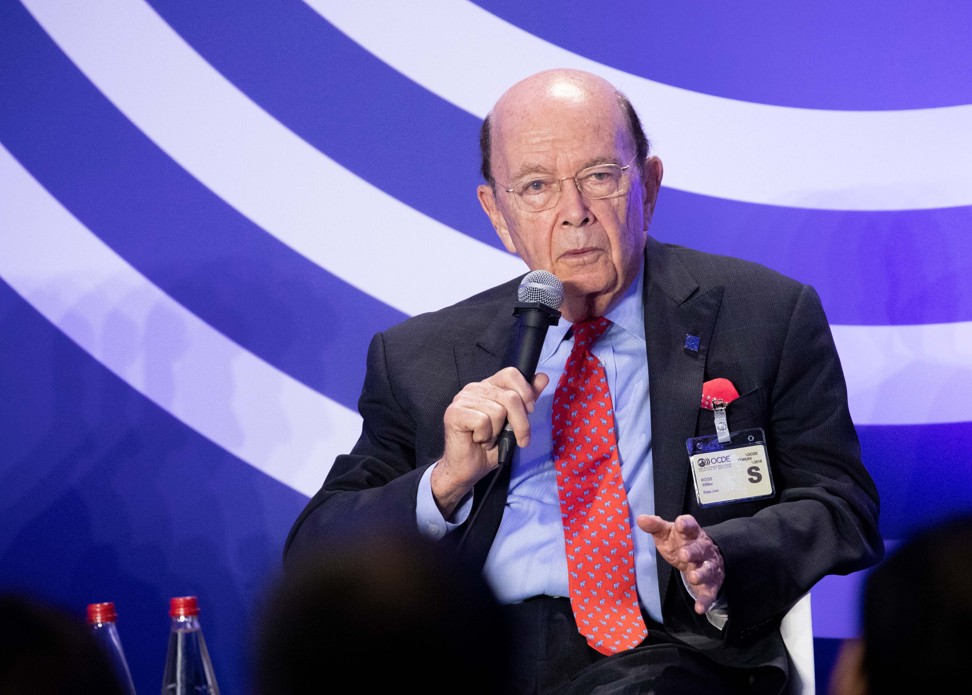
United States’ threat of tariffs on Chinese imports ‘just a negotiating tactic’, business leader says
Head of policy committee at American Chamber of Commerce in China phlegmatic on latest announcement by White House, despite Beijing’s rebuke
An advance party of US officials arrived in China on Wednesday ahead of the latest round of high-level trade negotiations, and the same day Beijing lambasted US President Donald Trump for his apparent turnaround on the issue of punitive tariffs on Chinese imports.
China’s commerce ministry said the advance group comprised 50 officials. A person familiar with the matter told the South China Morning Post they would probably seek to set the tone for the main trade talks, which are set to get under way on Saturday.
The American delegation for those will be led by US Commerce Secretary Wilbur Ross.
Beijing was quick to lash out at the statement, which appeared to contradict comments made two weeks ago by US Treasury Secretary Steven Mnuchin that Washington had put the tariffs “on hold” while the trade talks were continuing.
“We urge the United States to keep its promise,” Chinese foreign ministry spokeswoman Hua Chunying said, in reference to a joint statement released by the two countries after their latest round of negotiations.
“When it comes to international relations, every time a country does an about face and contradicts itself, it’s another blow to, and a squandering of, its reputation,” she said.
China ‘ready to fight’ if US carries out renewed tariffs threat
Despite the upset caused in Beijing, Trump’s decision to push ahead with the tariff plan should be seen as a negotiating tactic, and China should be more concerned with providing a level playing field for foreign companies, an American business leader said.
Lester Ross, who heads the policy committee of the American Chamber of Commerce in China, told a press conference on Wednesday that the latest announcement from Washington should be seen in the context of move and countermove.
“Threats of tariffs are very powerful and useful negotiation tactics,” he said. “[But] the White House decision won’t necessarily affect the overall sentiment.”
A person close to the talks told the Post that Chinese officials were concerned about what effect the White House announcement might have on the upcoming negotiations.
“[They] are very concerned about the risks to the stability of the [Chinese] economy if the US imposes major tariffs. That is their biggest worry, but they are not anxious to do anything about it, if it is not in their immediate interests,” the person said.
“China has trouble understanding what the US wants. First they failed to understand that the US administration was very serious, and second they were not clear what the US wanted or who the top players were.”
While American business leaders have said that focusing too much on the trade deficit is not the best way for Washington to redress the imbalance, they have also called on Beijing to do more to address their grievances regarding fairness and reciprocity.
The recent moves by the Chinese government, such as opening up the insurance sector and lifting ownership restrictions in the car industry, did not go far enough, Lester Ross said.
“Our members and the chamber believe that we are handicapped in our ability to produce in the [Chinese] market, to sell in this market and to produce in this market to sell to other markets by government policy.”
Don’t stress the trade deficit. Focus on getting a level playing field, say US business leaders
William Zarit, the chairman of the American chamber, said that if trade tensions were to escalate again he could not rule out the possibility of Beijing issuing countermeasures, such as putting more tariffs on American goods, prolonging the review process for takeover bids and tightening visa controls.
He also expressed concerns about Beijing’s “Made in China 2025” industrial upgrading plan, saying it did not promote fairness or innovation, but “amounts to a country competing with a company”.
“The major issue is that the plan … provides subsidies for state-owned and state-influenced companies … and protects the domestic market,” he said.
“[Then] those companies go and compete internationally with American companies that do not have state support.”
Xi Jinping urges China to go all in on scientific self-reliance after ZTE case exposes hi-tech gaps
Pang Zhongying, a professor of international relations at Ocean University of China, said that while the White House’s announcement was probably made with one eye on the midterm polls, it was a clear reminder that the trade dispute was still very much alive.
“The US is pressuring China to issue a package of concessions ahead of the elections,” he said. “While there is inconsistency within Trump’s negotiating team, China has yet to find a solution to the ongoing trade friction.”
China was unwilling to make any substantial concessions on its industrial policy or the reform of state-owned enterprises, and those things were at the core of the friction, Pang said.
“China has only a little room to redress the trade imbalance by raising its imports [of US goods]. It is a very dangerous time as the trade row could escalate into a political cold war,” he said.


